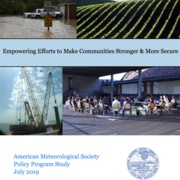Executive Summary
Weather, water, and climate create risk and opportunity for every community throughout the country and the world.
Virtually every social and economic sector and every institution underlying modern civilization is dependent on and vulnerable to weather, water, and climate. As a result, communities need accessible and reliable weather, water and climate information to save lives and property; boost the economy; protect biological systems and the goods and services they provide; and enhance homeland and national security.
Earth system observations, science, and services (OSS) characterize, communicate, and help guide local, regional, and national efforts to manage weather, water and climate risks and opportunities. The benefits to the United States from OSS are substantially enhanced by a rich web of public-private partnerships. These are rapidly evolving in response to social and climate change and the potential for interdisciplinary collaboration and advancement.
This study reaffirms six areas of emphasis for strengthening communities: 1) to improve the information available to communities through observations, science, model capability, and computational resources, 2) to enable more effective use of this information for societal benefit through improved collaboration and communication among stakeholders, scientists, and service providers, 3) to provide an effective policy framework for enhancing information and society’s ability to use it, 4) to create, strengthen, and evolve partnerships among public, private, academic, and NGO communities, particularly as opportunities, needs, and capabilities evolve over time, 5) to continuously expand the potential of the current and future workforce to deliver critical information and services, and 6) to empower the public to participate throughout the entire value chain to the maximum extent possible.
In addition, the study identifies four overarching findings that can further efforts to strengthen communities:
- Communities have both common needs and unique characteristics. This combination creates a need for place-based approaches and powerful opportunities for leverage from centralized efforts.
- Communities often face highly complex challenges that do not have clear solutions but that are broadly similar to challenges faced by other communities. Therefore, progress will depend on: having many local pilot projects at a range of scales (e.g. local, state, regional, national, and international); objective monitoring of those pilot projects for the early detection of success and failure; and rapid dissemination of lessons learned so that other communities can emulate successes and avoid failures.
- There is a wide range of potential federal roles for empowering and promoting community resilience. These are not mutually exclusive and comprehensive strategies almost certainly involve a diverse combination of approaches.
- Managing weather, water, and climate risks and opportunities depends on effective working relationships among public, private, academic, and NGO sectors and across levels of organization (local, state, national, and international).
Advances in Earth system observations, science, and services create an enormous opportunity for communities throughout the country to become stronger and more secure in the face of existing vulnerabilities and emerging risks due to climate change. Such efforts are most likely to be successful when they: focus on practitioner-defined challenges and opportunities; help create and sustain partnerships; develop, test, and refine practices; examine how knowledge is used and create or support the tools for doing so; and bring together a wide range of organizations in collaboration (e.g., local, state, and federal governments; academic institutions; the private sector; the NGO community).
Uptake and use of Earth system observations, science, and services by communities often depends on their having access to trusted sources. What constitutes a “trusted source” often depends on the specific audience. As a result, developing a diverse group of credible sources is helpful for reaching the full range of audiences within a community.
This AMS Policy Program study is part of an ongoing effort to build a community of practice that can help ensure that all people have information and services to manage risk and realize opportunities from weather, water, and climate. It is based primarily on a working group discussion that occurred on November 13, 2018 that focused on NOAA’s Regional Integrated Sciences and Assessments (RISA) network. The RISA network provides research and engagement mechanisms that promote the co-creation and co-application of scientific knowledge in order to strengthen local communities.
